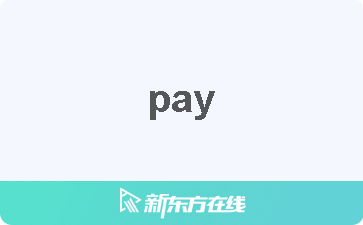pay
[NOUN, VERB]

1. [U 不可数名词] 薪水
Your pay is the money that you get from your employer as wages or salary.
双语例句
例:their complaints about their pay and conditions.
他们对薪水和工作条件的不满。
NOUN. 名词
pay back
1. [PHRASAL 短语] 偿还
If you pay back some money that you have borrowed or taken from someone, you give them an equal sum of money at a later time.
双语例句
例:He burst into tears, begging her to forgive him and swearing to pay back everything he had stolen.
他突然哭了起来,求她原谅他并发誓偿还他偷的所有东西。
2. [PHRASAL 短语] 报复
If you pay someone back for doing something unpleasant to you, you take your revenge on them or make them suffer for what they did.
双语例句
例:Some day I'll pay you back for this!
总有一天我会为此报复你的!
pay off
1. [PHRASAL 短语] 还清
If you pay off a debt, you give someone all the money that you owe them.
双语例句
例:It would take him the rest of his life to pay off that loan.
他得用余生来还清那笔贷款。
2. [PHRASAL 短语] (某行动)取得成功 , 带来好结果
If an action pays off, it is successful or profitable after a period of time.
双语例句
例:Sandra was determined to become a doctor and her persistence paid off.
桑德拉决心成为一名医生,她的坚持不懈终于带来了成功。
pay out
1. [PHRASAL 短语] 付出(巨款)
If you pay out money, usually a large amount, you spend it on something.
双语例句
例:The insurance industry will pay out billions of dollars for damage caused by Hurricane Katrina.
保险业将为卡特里娜飓风造成的损失赔付数十亿美元。
pay up
1. [PHRASAL 短语] (不情愿地)偿付
If you pay up, you give someone the money that you owe them or that they are entitled to, even though you would prefer not to give it.
双语例句
例:We claimed a refund from the association, but they would not pay up.
我们向该协会要求退款,但他们不肯把钱吐出来。
PHRASAL VERB. 短语动词
pay for itself
1. 赚回本钱
If something that you buy or invest in pays for itself after a period of time, the money you gain from it, or save because you have it, is greater than the amount you originally spent or invested.
双语例句
例:investments in energy efficiency that would pay for themselves within five years.
五年内能回本的能效方面的投资。
PHRASE. 习语
pays , paying , paid
1. [I 不及物动词] 支付 , 偿还
When you pay an amount of money to someone, you give it to them because you are buying something from them or because you owe it to them. When you pay something such as a bill or a debt, you pay the amount that you owe.
双语例句
例:Owners who have already paid for repairs will be reimbursed.
已经付了修缮费的业主将会收到退款。
例:The wealthier may have to pay a little more in taxes.
更有钱的人可能得多交点税。
2. [T 及物动词] 给…支付工薪
When you are paid, you get your wages or salary from your employer.
双语例句
例:The lawyer was paid a huge salary.
这位律师薪金很高。
例:I get paid monthly.
我拿月薪。
3. [T 及物动词] 雇用
If you are paid to do something, someone gives you some money so that you will help them or perform some service for them.
双语例句
例:There are people who are paid to sit around and play games.
有人受雇闲坐着玩游戏。
4. [I 不及物动词] 承担费用
If a government or organization makes someone pay for something, it makes them responsible for providing the money for it, for example, by increasing prices or taxes.
双语例句
例:a legally binding international treaty that establishes who must pay for environmental damage.
一项规定谁该为环境的破坏承担费用的具有法律约束力的国际公约。
5. [I 不及物动词] 带来(某数量的钱) , 带来钱
If a job, deal, or investment pays a particular amount, it brings you that amount of money.
双语例句
例:We're stuck in jobs that don't pay very well.
我们被困在钱给得很少的工作中。
例:The banks don't pay interest on those accounts.
银行不给那些账户支付利息。
6. [I 不及物动词] 给报酬
If a job, deal, or investment pays, it brings you a profit or earns you some money.
双语例句
例:There are some agencies now specializing in helping older people to find jobs which pay.
现在有一些机构专门帮助年纪较大的人找有酬劳的工作。
7. [I 不及物动词] (某种做法)有好处
If a course of action pays, it results in some advantage or benefit for you.
双语例句
例:It pays to invest in protective clothing.
在防护服上投资是值得的。
例:We must demonstrate that aggression will not pay.
我们必须证明侵犯是没有好处的。
8. [I 不及物动词] (为…)付出代价
If you pay for something that you do or have, you suffer as a result of it.
双语例句
例:He was to pay dearly for his lack of resolve.
他将为自己缺乏决心付出高昂的代价。
例:Why should I pay the penalty for somebody else's mistake?
我为什么要为别人的错误而受罚呢?
9. [T 及物动词] 进行 , 给予(与名词连用)
You use pay with some nouns, such as in the expressions pay a visit and pay attention, to indicate that something is given or done.
双语例句
例:Pay us a visit next time you're in Portland.
下次来波特兰的时候来看看我们。
例:He felt a heavy bump, but paid no attention to it.
他感觉重重地撞了一下,但没有在意。
VERB. 动词

关注新东方在线考雅课程中心
免费获取雅思备考资料包
雅思口语题库
扫码添加助教回复【口语题库】免费领取


 资料下载
资料下载
 公开课
公开课 编辑推荐
编辑推荐